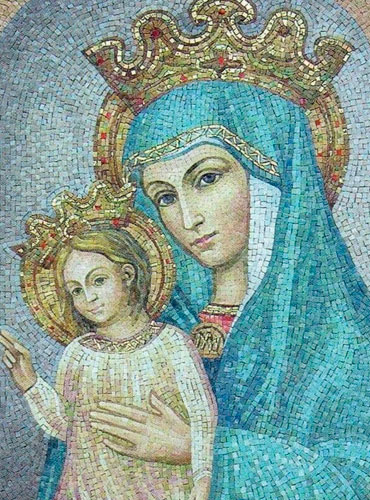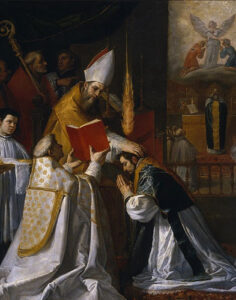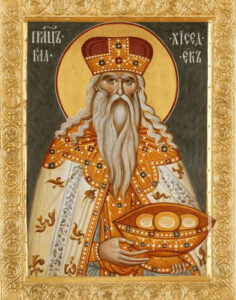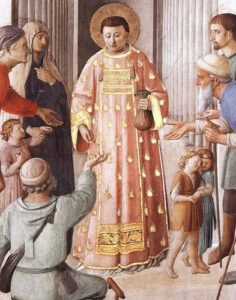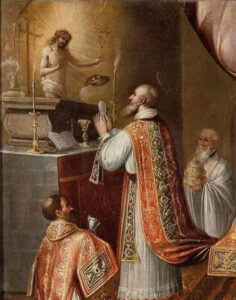Memorial Blessed Virgin Mary, Mother of the Church
Today we celebrate the memorial of Mary, Mother of the Church. Although this is only one of the first times the universal Church has celebrated it (it began only in 2018), the memorial itself and the invocation aren’t new: in fact, the Church in Argentina, Poland, and St. Peter’s Basilica had already set aside the Monday after Pentecost in honor of Mary, Mother of the Church, St. Paul VI bestowed the title “Mother of the Church” upon Mary in Lumen Gentium, and in St. Peter’s square there is a mosaic of Mary, Mother of the Church, that was installed at the request of Pope St. John Paul II. What’s new, though, is that now, throughout the whole world, the church is asked to recall, on the day after Pentecost, how Mary is the mother of the church.
In order to help us understand this devotion, the Congregation for Divine Worship issued an explanation: from this, we can consider, first, why Mary is considered Mother of the Church, especially in light of today’s readings, and, second, what it means for us.
The title Mother of the Church has a long history. Saint Augustine said that Mary is the “mother of the members of Christ, because with charity she cooperated in the rebirth of the faithful into the Church.” Likewise, Pope Saint Leo the Great said that “the birth of the Head is also the birth of the body, [meaning] that Mary is at once Mother of Christ, the Son of God, and mother of the members of his Mystical Body, which is the Church.”
When His “Mother [was] standing beneath the cross (cf. Jn 19:25) [as we heard in the Gospel just now], she accepted her Son’s testament of love and welcomed all people in the person of the beloved disciple as sons and daughters to be reborn unto life eternal. She thus became the tender Mother of the Church which Christ begot on the cross handing on the Spirit. Christ, in turn, in the beloved disciple, chose all disciples as ministers of his love towards his Mother, entrusting her to them so that they might welcome her with filial affection.
As a caring guide to the emerging Church, Mary had already begun her mission in the Upper Room, praying with the Apostles while awaiting the coming of the Holy Spirit (cf. Acts 1:14). In this sense, in the course of the centuries, Christian piety has honored Mary with various titles, in many ways equivalent, such as Mother of Disciples, of the Faithful, of Believers, of all those who are reborn in Christ; and also as ‘Mother of the Church.’
[It was on this foundation that Saint] Paul VI, on 21 November 1964, at the conclusion of the Third Session of the Second Vatican Council, declared the Blessed Virgin Mary as “Mother of the Church, that is to say of all Christian people, the faithful as well as the pastors, who call her the most loving Mother” and established that “the Mother of God should be further honored and invoked by the entire Christian people by this tenderest of titles”.
So, how does this celebration affect us? “This celebration will help us to remember that growth in the Christian life must be anchored to the Mystery of the Cross, to the oblation of Christ in the Eucharistic Banquet and to the Mother of the Redeemer and Mother of the Redeemed, the Virgin who makes her offering to God.”
Given the importance of the mystery of Mary’s spiritual motherhood, which from the awaiting of the Spirit at Pentecost has never ceased to take motherly care of the pilgrim Church on earth, [this memorial was extended to the entire church, with] the hope . . . that this celebration will remind all Christ’s disciples that, if we want to grow and to be filled with the love of God, it is necessary to plant our life firmly on three great realities: the Cross, the Eucharist, and the Mother of God. These are three mysteries that God gave to the world in order to structure, fructify, and sanctify our interior life and lead us to Jesus. These three mysteries are to be contemplated in silence.
Through the intercession of Mary, Mother of the Church, let us ask for the grace to trust in God’s providence and His love for us, and to show that trust through obedience.

